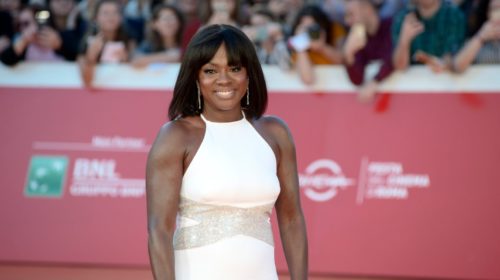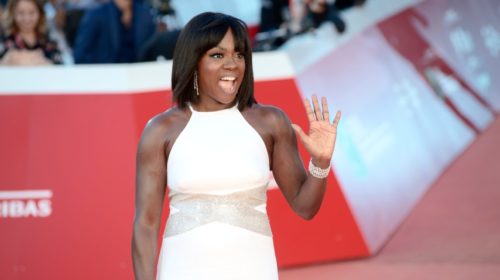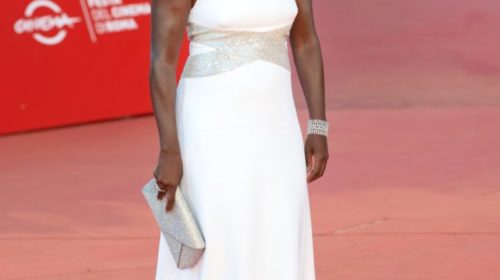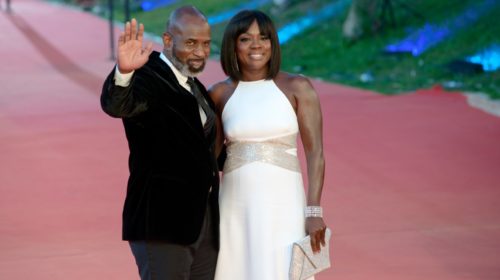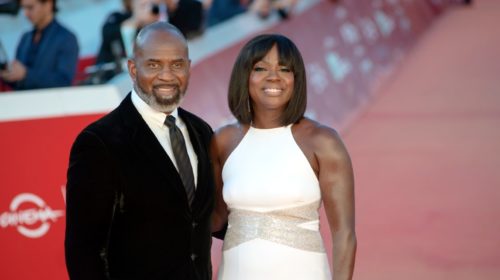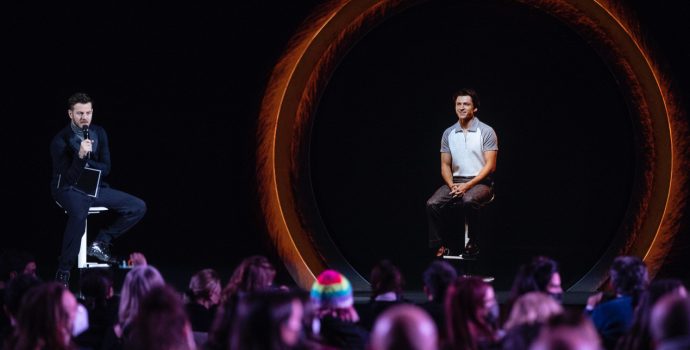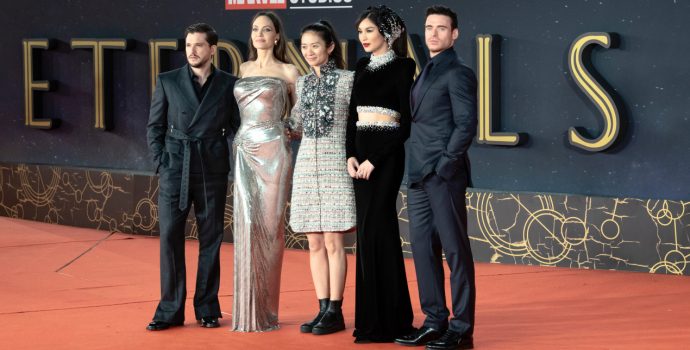Oscar-winning actress receives the Lifetime Achievement Award after meeting the audience in the last Close Encounter of the festival
Rome Film Festival’s Close Encounters ended with a very special guest: Viola Davis. The Oscar-winning actress met the audience yesterday, October 26, 2019, in a sold out Sala Petrassi at Auditorium Parco della Musica. Davis, 54, is the first black actress who achieved the Triple Crown of Acting: she won an Academy Award for Denzel Washington’s adaptation of the stage play Fences, two Tony Awards for her roles in King Hedley II and Fences and a Primetime Emmy Award for her performance in the TV show How to Get Away with Murder.
The american actress attended the festival to receive the Lifetime Achievement Award, presented by italian actor Pierfrancesco Favino, after a long master class moderated by Rome Film Festival’s Artistic Director, Antonio Monda.
You have a very eclectic career: you started with theatre, then you moved to cinema and TV. Which medium do you like the most?
«I have the most fun on stage: that’s where I started off my career, I have an undergraduate degree in theatre, I went to Julliard. During my training I fell in love with Arthur Miller, William Shakespeare and I fell in love with the fact that, when people come to the theatre, they are not thinking about box office receipts, sex appeal or youth: they only think about having a human experience and that’s where I live.»
You had a very important role, alongside Meryl Streep, Philip Seymour Hoffman and Amy Adams, in Doubt, by John Patrick Shanley, which is also based on a stage play. What do you remember about that film?
«It was one of the first big jobs I ever got: I couldn’t believe my blessing I enjoyed that role, once again, because it’s taken from a stage play and it was approached like a play: we had three weeks of rehearsals. Often, in our profession, we don’t have the benefit of a process.»
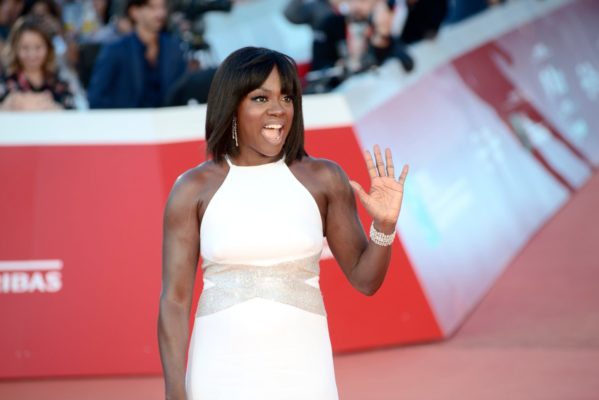
American playwright August Wilson, who also wrote the stage play Fences, was one of your mentors. How did he influence you?
«He was extraordinarily important. When I think about great films like Klut, Taxi Driver, Kramer vs. Kramer, what I see is intricate studies on what makes characters human. They don’t have to be likeable, they don’t have to be nurturing. This is what I miss with people of color: when I see them on the screen, I see watered-down, palatable versions of them. They’re overly nurturing, overly strong, overly knowledgeable, but I never see specifically who they are. The thing with August Wilson is that he wrote us as people: there’s no ethic machine, there’s no apology and that is what theatre is supposed to be about. You should be able to come into the theatre and see yourself, even the parts of yourself that you keep private. The greatest thing that August gave us as actors, even in terms of his legacy, is that he let us talk. I see my mom, I see my dad, I see myself in all the characters that he has written. Also, people of color don’t have to be always inspiring. Are white people inspired by the character in Taxi Driver? He’s a sociopath! But in that character you see humanity. That’s art.»
How do you approach your characters? Is it a good thing to fully indentify with them?
«Good characters should be approached like a detective. If I get an interesting character, I feel like I have to relate to them, something speaks to me. But then you have to investigate with all of the facts, the given circumstances. You have to study people, you have to study yourself and how you feel in any given moment. You take all that life and you pour it into the character. Fortunately, or unfortunately, you don’t always have the opportunity to do that.»
You were arrested with your mother when you were 2 years old, while demonstrating for civil rights. How did this experience impact you?
«I learned the power of speaking up for oneself and the fact that it’s everyone’s right. Everything that you do is a fight and I never knew that before. To be honest, I became an artist because I thought “I can’t do a 9 to 5! Someone will fire me!”, I wanted to be a lazy artist, but I learned through my job that I am constantly fighting for my voice. When I started, I was just thinking about getting a great role on TV until I stepped into it and I was like: “Holy s#*t!”.»
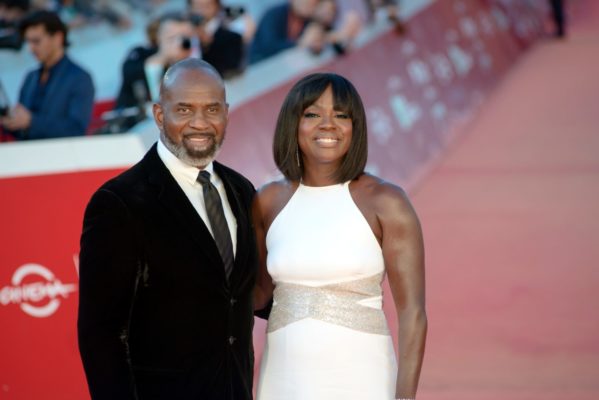
Before the “Me Too scandals”, and all the discussion involving the inclusion issue, over 90% of The Academy was made up of white men and women. Is something changing?
«I think it’s a reduction to answer the Me Too or the diversity and inclusion issue by relegating it to just The Academy. Everything is white except for the NBA and NFL. I mean, studios are white, executives are white, films are white: how many films do they have this year with people of color being a part o f the conversation? Once me, Taraji P. Henson, Kerry Washington leave TV, how many women do we have on shows? Critics are white, usually male. So if you’re just looking at The Academy, you’re not looking far enough. We have to start with the filmmaking process, first: what films get the green light vote? What kind of films are they? Who do we have in the films? I don’t know how many people of color are Academy members but, let’s say, even if 93% are but only one film with people of color in it has been made that year, what good is it? At the end of the day, we want to work on great films which reflect who we are, we want to have an expansiveness and diversity of storytelling, we want to get paid the same way white actors get paid, because we don’t. I think things are changing, but we’ve got a long way to go.»
Martin Scorsese and Francis Ford Coppola said that superhero movies are not cinema, but “theme parks”. You had roles in action films and also in Suicide Squad. What’s your opinion?
«I like those films. I like a good Marvel/DC movie, but I’ve mentioned a film by Scorsese that I think is fantastic. Albert Einstein once said “Imagination is more valuable that knowledge” and If I did not have my imagination, I would still be ‘poor Viola living in Central Falls, Rhode Island’. My imagination defined me: I could escape into a world that was infinite, a world that I could create on my own. Art lives in that world, it’s God’s playground. It’s not up to anyone to say what deserves to be there and what doesn’t. To me there’s a place for all of it. Scorsese was voicing his opinion, which I think is valid, but… I like a good Marvel movie!»


